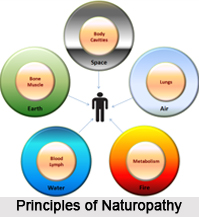 Principles of Naturopathy believe in the 5 elements of nature - Earth, Sky or Space, Fire, Water and Wind. These 5 elements form the contour of the naturopathy treatments as these are the source of energy and helps in the treatment. The body has natural abilities to resist diseases and to heal itself. This very concept of naturopathy gains diction amidst the principle of naturopathy.
Principles of Naturopathy believe in the 5 elements of nature - Earth, Sky or Space, Fire, Water and Wind. These 5 elements form the contour of the naturopathy treatments as these are the source of energy and helps in the treatment. The body has natural abilities to resist diseases and to heal itself. This very concept of naturopathy gains diction amidst the principle of naturopathy.
Concept of Naturopathy
According to the Principle of Naturopathy therefore, addressing the root cause of ailment and eliminating the root cause is necessary for a healthy body. The principle of naturopathy thus focuses on naturally occurring and minimally invasive methods, trusting to the healing power of nature.
According to the Principle of Naturopathy, "Pran" is the vitality force. The holistic treatment procedure therefore aims at providing Pran or life force to the body by protecting the body from both the external and internal threats. Although achieving this state is difficult however, it is achievable if and when a harmonious and coordinated functioning of the 5 elements of nature exists. Naturopathy believes that control over senses is the foundation of good health and therefore a well planned life, sattvic diet and positive thinking are necessary to ensure health.
Naturopathy believes that every human body has germs that grow and multiply and these germs are the source of all sorts of ailment. To prevent germ growth therefore naturopathy prescribes the daily and regular cleaning and detoxification of the body. Naturopathy purifies the blood and tissues to develop immunity, amidst simple nature cure process.
The Principle of Naturopathy is self-described by 6 core values which are as follows:
Do No Harm: Firstly, naturopathy advises not to harm anybody. The process of healing includes the generation of symptoms, which are, in fact, expressions of the life force attempting to heal itself. Therapeutic actions should be complementary to and synergistic with this healing process. The physician"s actions can support or antagonize the actions; therefore, methods designed to suppress symptoms without removing underlying causes are considered harmful and are avoided or minimized.
Identify and Treat Causes: Identification and removal of the root causes of illness, rather than eliminating or suppressing symptoms are necessary. Illness does not occur without cause. Underlying causes of disease must be discovered and removed or treated before a person can recover completely from illness. Symptoms are expressions of the body"s attempt to heal, but are not the cause of disease. Therefore, naturopathic medicine addresses itself primarily to the underlying causes of disease, rather than to the symptoms. Causes may occur on many levels, including physical, mental-emotional, and spiritual. The physician must evaluate fundamental underlying causes on all levels, directing treatment at root causes as well as seeking relief of symptoms.
Let Nature Heal: Naturopathy insists to recognize, respect and promote the self-healing power of nature that underlies in each individual. The body has the inherent ability to establish, maintain, and restore health. The healing process is ordered and intelligent. Nature heals through the response of the life force. The physician"s role is to facilitate and augment this process, to identify and remove obstacles to health and recovery, and to support the creation of a healthy internal and external environment.
Educate Patients: Educating and inspiring rational hope while encouraging self-responsibility for health is needed. Beyond an accurate diagnosis and appropriate prescription, the physician must work to create a healthy, sensitive interpersonal relationship with the patient. A cooperative doctor–patient relationship has inherent therapeutic value. The physician"s major role is to educate and encourage the patient to take responsibility for his or her own health. It is the patient, not the doctor, who ultimately creates or accomplishes healing.
Treat the Whole Person: Naturopathy treats each person by considering all individual health factors and influences. Health and disease are conditions of the whole organism, involving a complex interaction of physical, spiritual, mental, emotional, genetic, environmental, and social factors. The physician must treat the whole person by taking all of these factors into account. The harmonious functioning of all aspects of the individual is essential to recovery from and prevention of disease, and requires a personalized and comprehensive approach to diagnosis and treatment.
Prevent Illness: Emphasizing the condition of health to promote well-being and to prevent diseases for the individual. Each community and indeed the whole world is one of the basic principles of naturopathy. The ultimate goal of naturopathic medicine is prevention. This is accomplished through education and promotion of lifestyle through good habits that foster health. The physician assesses risk factors and hereditary susceptibility to disease and makes appropriate interventions to avoid further harm and risk to the patient. The emphasis is on building health rather than on fighting disease.
These principles are based on the objective observation of the nature of health and disease and are examined continually in light of scientific analysis. These principles stand as the distinguishing marks of the profession.




















